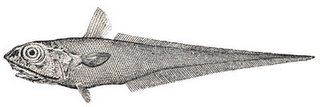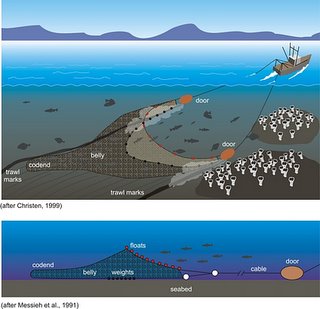The onion-eye grenadier looks like it swam out of a Dr. Seuss book, lives at deeps up to 3,000 ft, and is about as far from desirable seafood as you can get. Its scales are so tough it can only be economically processed for its liver.
 Yet researchers at Memorial University in Newfoundland recently reported in the prestigious journal Nature that populations of this obscure fish had declined in Canadian waters by an incredible 93.3% over the last 26 years.
Yet researchers at Memorial University in Newfoundland recently reported in the prestigious journal Nature that populations of this obscure fish had declined in Canadian waters by an incredible 93.3% over the last 26 years.Why would such an unpalatable fish living up to a kilometre underwater be so threatened?
Because we are fishing for it.
Demonstrating that it has learned exactly nothing from the infamous collapse of the cod stocks, Fisheries and Oceans Canada (DFO) continues to allow an unregulated fishery for onion-eyed grenadiers for the simple reason that in many areas there is virtually nothing left to fish for.
DFO is best known to many as the department that killed the cod, and it seems they will not allow dragger boats to sit idle until the ocean is truly empty.
“Draggers” are so named because they do exactly that, drag a weighted net across the bottom of the ocean and pull up dead whatever happens to end up inside.
Huge amounts of so-called “by-catch” fish and other marine life are hauled up in dragger nets and typically pitched over the side because they are caught accidentally or are simply inedible.

The onion-eye grenadier is primarily caught and kept as by-catch, but that in itself is indicative of a larger problem.
For instance, there is a “moratorium” on fishing for a related and critically endangered species of grenadier, however these fish continue to be hauled up dead in dragger nets. It is now estimated that both these grenadier species will disappear from Canadian waters in as little as 20 years.
The scientists at Memorial further lamented that the plundering of deep-sea ecosystems by dragger boats could lead to many other species being lost before they can even be identified.
Given the on-going pillage of the deep ocean, perhaps scientists should focus future research efforts on the freezer section of their local supermarket.
Hyperbole? Hardly.
A researcher at Dalhousie University was alarmed several years ago to find a species of deep-sea octopus unknown to science in the seafood section of his local Safeway.
Dragging a net that weighs several thousand kilograms across the ocean floor also has predictable effects on areas with sensitive bottom habitat. Unlike other more progressive jurisdictions such as Norway, the Canadian government continues to indiscriminately permit the use of dragger gear regardless of the ocean floor habitat.

In fact it was revealed in December 2005 that Canada worked behind the scenes to scuttle a UN ban on dragging on the high seas. This is in spite of a poll released this week by conservation groups showing that 78% of Canadians would support such a ban.
DFO is apparently worried that such a prohibition might undermine their ability to allow the continued scouring of the ocean floor within Canadian waters.
Canadians should not simply accept this on-going culture of incompetence within DFO. It is the important responsibility of the federal government to set and enforce clear conservation goals so that sustainable commercial fishing does not instead become fish mining.
While the collapse of the cod is the most notorious blunder of DFO, we should also not forget the decimation of the west coast wild salmon stocks, and the massive outbreaks of sea lice from net pen aquaculture.
The impressive list of Canadian fisheries disasters is merely a symptom of a larger problem. Fisheries ministers come and go but the upper bureaucracy of DFO - in some cases the same individuals that presided over the collapse of the cod fourteen years ago - remain stubbornly in place.
A thorough housecleaning of senior DFO bureaucracy is long overdue. Yet the response from our campaigning politicians is sadly lacking. Both the Liberals and Conservatives seem content to blame the state of offshore fish stocks on foreign interlopers – a favourite political straw man to distract attention away from ineptitude exhibited by both parties when they were in power.
Instead what the researchers at Memorial University are calling for is perhaps the only hope for the delicate deep-sea ecosystems: marine protected areas that would prohibit the relentless scouring of the ocean floor by dragger nets, while there still fish stocks left to save.
Mitchell Anderson is a freelance writer based in Vancouver. This piece ran in the National Post on January 19, 2006
No comments:
Post a Comment